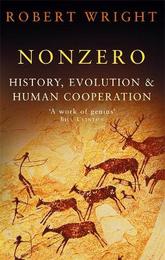
|
Nonzero: History, Evolution & Human Cooperation
Paperback / softback
Main Details
| Title |
Nonzero: History, Evolution & Human Cooperation
|
| Authors and Contributors |
By (author) Robert Wright
|
| Physical Properties |
| Format:Paperback / softback | | Pages:448 | | Dimensions(mm): Height 198,Width 132 |
|
| Category/Genre | Popular science |
|---|
| ISBN/Barcode |
9780349113340
|
| Classifications | Dewey:303.483 |
|---|
| Audience | |
|---|
|
Publishing Details |
| Publisher |
Little, Brown Book Group
|
| Imprint |
Abacus
|
| Publication Date |
6 September 2001 |
| Publication Country |
United Kingdom
|
Description
Robert Wright challenges the conventional view that biological evolution and human history are aimless. Employing game theory - the logic of "zero-sum" and "nonzero-sum" games - he isolates the impetus behind life's basic direction: the impetus that, via biological evolution, created complex, intelligent animals, and then via cultural evolution, pushed the human species towards deeper and vaster social complexity. In this view, the coming of today's independent global society was "on the cards" - not quite inevitable, but, as Wright puts it, "so probable as to inspire wonder". Wright takes on some of the past century's most prominent thinkers, including Isaiah Berlin, Karl Popper, Stephen Jay Gould, and Richard Dawkins, arguing that a coolly specific appraisal of humanity's three-billion-year past can give new spiritual meaning to the present and even offer political guidance for the future.
Author Biography
Robert Wright has written extensively for THE ATLANTIC MONTHLY, THE NEW YORKER and TIME magazine, and currently works as a senior editor at THE NEW REPUBLIC.
Reviews'Wright has constructed an interesting thesis... bold and thought-provoking.' SUNDAY TIMES 'Not only a fascinating read but an important one.' INDEPENDENT ON SUNDAY 'One of the main layman's objections to the supposedly random process of evolution is that for all its inherent pointlessness, evolution seems to have a goal, a narrative, a conscious direction. And that direction is towards complexity. Germs become animals. Apes become humans. Blood-caked Aztec savages become liberal-minded East Coast essayists. Now Robert Wright, author of the much-praised The Moral Animal, has come along with a contentious new book to tell us that the layman has been on to something all along. Evolution does have a goal. The title of Wright's book comes from games theory, which divides human interactions into "zero sum games", where for every winner there's a loser, and "non-zero sum games", where everyone gains. Wright's aim is to knit together this theory with anthropology, zoology, biology, and history, plus a dash of chaos theory, and thus attest that "non-zero sum altruism" is the natural inclination of humankind. To prove this he cites such disparate phenomena as the sago-swapping natives of the US Northwest, the global government-in-waiting that is the European Union, and the anarchically generous ethos that rules the Net--all of which apparently go to show that we are, deep down, caring, sharing nice guys. Wright's second aim is to show this niceness is no accident: evolution helps to make us that way. The author's learning is lightly worn. Sometimes too lightly. After a while his chatty, hey-let's-have-a-beer style starts to grate: "When was the last time you invented a boomerang?"; "Ah, Tahiti!". There are also some minor errors, like his claiming that Britain fought the Hundred Years War (it was England), or his perception that milkmen are a thing of the past, that make you wonder whether he has finessed some of the more intractable scientific arguments. Certainly his book has already attracted some brickbats from the atheistic hardnuts of evolutionary psychology. But the case that he advocates remains as exciting as it is unsettling. Because, if evolution does have a point, if human history has a deliberate, conscious, "narrative drive", who had the idea? Who's the scriptwriter of Man, the Movie?' - Sean Thomas, AMAZON.CO.UK REVIEW
|